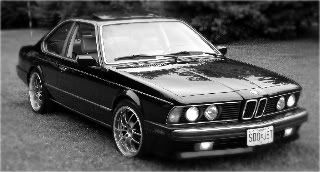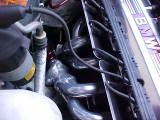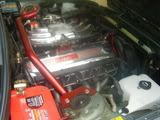 |
Unofficialbmw.com
The UnofficialBMW BB, answers for your BMW questions.
|
Support Unofficialbmw.com :: Download Free Healthy Habits iPhone app!
| View previous topic :: View next topic |
| Author |
Message |
jamesnau
Joined: 19 Jul 2002
Posts: 520
Location: NC State University
|
 Posted: Wed Mar 12, 2008 8:27 am Post subject: zinc additive for new engine oils Posted: Wed Mar 12, 2008 8:27 am Post subject: zinc additive for new engine oils |
 |
|
UBBers,
I have just learned from a colleague that federal mandates require the removal of most of the zinc and phosphorus additives from new engine oils. These oils are labelled for service SM. He tells me that without the zinc and phosphorus, engine wear is accelerated. Because they are only drip lubricated (not pressure lubricated), camshafts are especially prone to accelerated wear. He recommended that I begin using an additive made by Torco in my two old cars, the '85 325e and my '91 Volvo 740.
Do any of you have any reliable info on this subject?
haber, if you read this, what is the chemical truth here?
Jim
original owner,
'85 325e, born Oct. 1984, 180K |
|
| Back to top |
|
 |

|
bimmerjo

Joined: 24 Jun 2006
Posts: 389
Location: Aurora, Mo
|
 Posted: Wed Mar 12, 2008 9:21 am Post subject: Posted: Wed Mar 12, 2008 9:21 am Post subject: |
 |
|
I wouldnt worry TO much about it, If i where you i would just run mobile1 or a higher grade conventional oil with the Lucas oil additive, when i put it in my car, i instantly noticed it ran a little bit smoother
_________________

1988 BMW 635CSi - Black
1988 BMW 325iX - Grey - Soon will be black
1986 BMW 325ES - Black
2008 Kawi ZZR600 - Black
1977 Custom Deluxe - Red |
|
| Back to top |
|
 |
idanity

Joined: 21 May 2005
Posts: 3097
Location: N.W.U.S.A.
|
 Posted: Wed Mar 12, 2008 2:54 pm Post subject: Posted: Wed Mar 12, 2008 2:54 pm Post subject: |
 |
|
now i gotta buy vitamins for my old engines 
_________________
 ........ ........ .. .. |
|
| Back to top |
|
 |
bearing01

Joined: 22 Jul 2005
Posts: 520
Location: San Diego
|
 Posted: Wed Mar 12, 2008 7:16 pm Post subject: Posted: Wed Mar 12, 2008 7:16 pm Post subject: |
 |
|
I think the reduction of DZZP (zinc dithiophosphate) in API-SM oils only really hurts the engine if you're breaking in a camshaft. After the engine is broken in you can run the regular API-SM stuff.
If breaking in a cam maybe you could use 40 weight motorcycle oil or racing oil. |
|
| Back to top |
|
 |
jamesnau
Joined: 19 Jul 2002
Posts: 520
Location: NC State University
|
 Posted: Thu Mar 13, 2008 1:48 pm Post subject: Posted: Thu Mar 13, 2008 1:48 pm Post subject: |
 |
|
I am not sure that switching to Mobil 1 is enough...here is the article that my friend gave me. As you see, it particularly applies to the Porsche engine, but if SM oils are not good enough for Porsche, perhaps they are not good enough for our beloved e30s as well. I plan to conduct some research into this issue, possibly engaging my colleagues in the Materials Science Department here at NC State.
Jim
'85 325e, 183K, original owner
The purpose of proper lubrication is to provide a physical barrier (oil
film) that separates moving parts reducing wear and friction. Oil also
supplies cooling to critical engine components, such as bearings.
Detergent oils contain dispersants, friction modifiers, anti-foam,
anti-corrosion, and anti-wear additives. These detergents carry away
contaminants such as wear particulates and neutralize acids that are
formed by combustion byproducts and the natural breakdown of oil. Not all
motor oils are created equally when it comes to the levels of additives
and detergents used. The focus of this study is on the levels of zinc and
phosphorus found in motor oils, more exactly, the zinc (Zn) and phosphorus
(P) that makes up the anti-wear additive ZDDP, zinc dialkyl
dithiosphosphate.
What general characteristics make motor oils specifically well suited to
an aircooled engine? Aside from recommendations issued by Porsche, what
makes a good oil? These oils must be thermally stable, having a very high
flashpoint, and must "maintain proper lubrication and protect vital engine
components under the extreme pressure and the high temperature conditions"
found in aircooled Porsches. Porsche recommends and uses Mobil 1 0w40 as a
factory fill in newer watercooled models and their 15w50 has been a
popular choice used by many for their aircooled models year round in a
wide range of climates.
Porsche's recommendation in hand, our initial analysis from 2005 and 2006
found that then recent SH/SJ/SL formulations of Mobil lubricants tested,
including Mobil 1, have had similar 0.12-0.14% Zn and P content, which we
thought was a good thing, but looking closer, Mobil 1 0w40 had somewhat
less Zn and P, at 0.10%. Current SM formulations are at the 0.10% level or
less. This confirms the industry wide trend of the reduction of Zn and P
from motor oils, with the eventual reduction to 0.06-0.08% or even worse,
the elimination of these additives, which are essential to an aircooled
Porsche engine's longevity.
Many Porsche repair shops have acknowledged that these newest SM and CJ-4
motor oils are not sufficient for protecting any Porsche engine. With
longevity and the protection of vital engine components in mind, many
shops are recommending non-approved oils or the addition of oil
supplements at every oil change. Shops that used to run M1 in their race
cars have either switched to Mobil's synthetic motorcycle oils or have
resorted to using premium dino oills, such as Swepco 306 15w40 or Brad
Penn Racing 20w50 oils, for their higher levels of protection. For most
owners, the reduction in longevity of a catalytic converter is a small
price to pay considering the many thousands of dollars it costs to
properly rebuild a Porsche engine. It is worth noting that most Porsches
have lived the majority of their lives with high Zn and P oils, and we
never hear of problems with their catalytic converters.
Oil companies have been cutting back on the use of Zn and P as anti-wear
additives, and turning to alternative zinc-free (ZF) additives and ashless
dispersants since Zn, P, and sulfated ash have been found to be bad for
catalytic converters. One such ZF dispersant/anti-wear additive is boron.
Most of the SM and CJ-4 oils we tested contain significant concentrations
of boron (B) to offset the reduction of Zn and P. The performance of these
zinc-free anti-wear additives has only been proven with ultra-low sulphur
fuels, not readily available in the United States with exception of new
diesel fuels since 2007.
Additionally, Boron works best in the presence of Zn and P and may better
serve to complement these anti-wear additives than as a replacement for
them, according to recent studies. Since we are discussing boron and
aircooled engines specifically, the highest levels of boron we found were
in Harley Davidson's SYN3 motor oil, which is specifically formulated for
an aircooled engine, but at levels six to ten times that of what is
present in any reformulated SM or CJ-4 motor oil. Harley's SYN3 didn't
reduce the Zn or P, just supplemented it with the added boron. Similarly,
Swepco's 306 has high levels of boron in addition to high levels of Zn and
P.
This reduction is a mandate issued by API, American Petroleum Institute,
who is in charge of developing standing standards for motor oils. The
latest API SM standard for car oils calls for a zinc and phosphorus
content less than 0.08% to reduce sulfur, carbon monoxide, and hydrocarbon
emissions. As a result of this mandate, some motor oils now have as little
as 0.05% zinc and phosphorus. Prior to the new CJ-4 API standard for
diesel oils, we found most of the CI-4 15w40 and 5w40 oils to have
excellent levels of Zn and P. We did observe Mobil, among other
manufacturers, beginning the use of boron in their oils as a zinc-free
(ZF) anti-wear additive in various CI-4 and SL formulations, but always
with high Zn and P levels, above current API limitations.
It would appear now that with the reduction of Zn and P in these newest
CJ-4 oils, that boron will now become a more common anti-wear additive,
and even with lowered Zn and P levels, the boron levels are still nowhere
as close to what previous CI-4 and SL oils, so the long-term performance
of these new oils is unknown and unproven in vehicles running fuels other
than those classified as ultra-low sulphur, typically less than 10ppm as
alluded to earlier. Remember, unleaded fuels don't have these low sulphur
levels, at least right now anyways!
However, it is worth noting that these new API guidelines do not need
apply to "racing," "severe duty," or any motor oils that do not carry an
API "starburst" seal or clearly state for off-road-use only. Motor oils
meeting "Energy Conserving I or II" standards should be avoided as well as
those with an API SM classfication, with it's lower Zn and P levels, which
applies only to 0w20, 0w30, 5w20, 5w30, and 10w30 "ILSAC" grades. Although
having been more sensitive to emissions and the environment than American
standards, we find the European ACEA A3 and B3/B4 classifications, which
place a cap on P levels at 0.10-0.12%, to be better in taking into
consideration wear and engine longevity while limiting emissions and
protecting emissions control devices.
ACEA A3 sequences require higher high-temperature high-shear (HTHS)
viscosities, stay in grade sheer stability, and tighter limits on
evaporative loss, high temperature oxidation, and piston varnish. This
makes oils meeting these ACEA standards that much better for your Porsche,
especially since wear limits are much more stringent for valve train wear,
1/6th to 1/4th the wear allowed in the sequences for API's newest SM or
CJ-4 standards. Porsche requires a minimum 3.5 cSt @ 150C HTHS viscosity,
which is a good measure of the protection any given motor oil provides,
and requires that all approved oils be of group III or better base stocks,
which includes quality highly refined parrafinic petroleum bases like
those used by Brad Penn and Swepco. In general, synthetics provide the
best protection, but a good additive package and quality parrafinic base
stock has been proven to work just as well according to research presented
to the SAE.
Failure to use the right oil, use proper filtration, or observe proper
changing intervals can affect the performance of even the best motor oil.
This also includes changing the oil too often (needlessly bad for the
environment and your wallet) or not often enough. Against conventional
wisdom, engine wear decreases as oil ages to a certain extent, which means
that changing your oil more frequently actually causes engine wear; these
findings were substantiated by studies conducted by the auto manufacturers
and petroleum companies, leading to drain intervals increased from 3,000mi
to 5,000-7,500mi in most domestic vehicles, using mostly non-synthetic
oils.
Based off of extremely long drain intervals recommended by most European
manufacturers, some in excess of two years and 20,000 mi, some users have
found it best to reduce those intervals by half or even a quarter.
Vehicles with track time or sustained high oil temperatures or RPMs should
have their oil changed after every event. Vehicles subjected to very short
drives or sustained operation in heavy traffic should indeed be serviced
more often. Regular used oil analysis is the best way to determine ideal
drain intervals for your driving habits — a good rule of thumb is to
change the oil with the TBN, or total base number, is reduced by 50% of
the original total (requiring you to also know your oil's virgin TBN).
With this knowledge in hand, using a quality motor oil with proper
filtration and regular service is the best thing to do for your engine and
to protect your investment. |
|
| Back to top |
|
 |
bearing01

Joined: 22 Jul 2005
Posts: 520
Location: San Diego
|
|
| Back to top |
|
 |
idanity

Joined: 21 May 2005
Posts: 3097
Location: N.W.U.S.A.
|
 Posted: Thu Mar 13, 2008 5:27 pm Post subject: Posted: Thu Mar 13, 2008 5:27 pm Post subject: |
 |
|
the key to that article was the porche air cooled engines.
and I've never heard of brad penn, or swepco oils, but i have wondered about 2stroke/motorcylce oils.
that article is also above my education on base numbers of oil, etc. i just wonder about castrol, and i hope its all gonna be ok.
_________________
 ........ ........ .. .. |
|
| Back to top |
|
 |
haber
Joined: 14 Jun 2002
Posts: 1663
Location: Tennessee
|
 Posted: Thu Mar 13, 2008 5:50 pm Post subject: Posted: Thu Mar 13, 2008 5:50 pm Post subject: |
 |
|
With what I am familiar with the article you poste is right on and sounds just like what our oil guys would say. Oil additives are good(why else would they add them) and less additives are bad. Synthetic oils still need an additive package for all the things mentioned.
From some experience I can say that in some cases change intervals have needed to come down in diesels because the newer oils may fail sooner. That can manifest itself in several ways but worst cases lead to engine component failure from lack of lubrication or corrosion which the additives were there for. ZDDP being the main antiwear with Boron which depleats more rapidly that Z&P and sulphated Calcium or Magnesium for combustion acid neutralization. One school of thought is that taking the sulphur out of oil reduces the acid getting in the crankcase but EGR on engines tends to increase acid that may get into the case. It's all terribly complicated with the advent of diesel particulate filters on the exhaust system.
Anyway, fleets are trying to maximise their oil drain interval and that means 20-50k miles. We are running our cars at a much lower duty cycle and probably 3-5k miles drains. We are in no where near the pinch the fleets are facing with the new chemistry. Stay dilligent with quality oil and drains and we should be OK.
And for any break in of new cams and such there should be liberal amounts of moly assembly lube used. I will not be surprised to see a resurgence of snake oil additives with all this news. Some like moly or zinc could be a good thing to consider with lower formulated oils.
_________________
-------- -x--x-- SI ByePass |
|
| Back to top |
|
 |
idanity

Joined: 21 May 2005
Posts: 3097
Location: N.W.U.S.A.
|
 Posted: Thu Mar 13, 2008 8:33 pm Post subject: Posted: Thu Mar 13, 2008 8:33 pm Post subject: |
 |
|
how does castrol fair 
btw, my old (sold ) 81 datsun had "piston slap", and a mechanic said to use straight 30 weight, (which helped quiet the slap down).
later i used 50 weight, and tried 60, but all in all i really liked the 30w.
i am under the impression that 10-30 or 20-50 is only relative at startup/cold engines, and when it warms up, i would be getting 10, or 20 weights.
is that true?
and
is castrol good (straight weights too)
_________________
 ........ ........ .. .. |
|
| Back to top |
|
 |
killerbeem

Joined: 01 Aug 2005
Posts: 496
Location: Detroit, MI
|
 Posted: Thu Mar 13, 2008 11:06 pm Post subject: Posted: Thu Mar 13, 2008 11:06 pm Post subject: |
 |
|
Would you say that "piston slap" can sound a lot like the ping from bad valve alignments? Or are they noticably different?
MK
_________________
Currently looking for a good e30 to rebuild
1994 318i - Jeni (sold)
1991 325i - Lynn (Sold)
1984 325e - Rachel (Sold)
BMWCCA Member
Find me on Twitter: @mkilpatric |
|
| Back to top |
|
 |
idanity

Joined: 21 May 2005
Posts: 3097
Location: N.W.U.S.A.
|
 Posted: Fri Mar 14, 2008 10:57 am Post subject: Posted: Fri Mar 14, 2008 10:57 am Post subject: |
 |
|
it was deep in the crank, and sounds like a rod going.
it just sounds like the piston was hammering the head with every stroke, so at normal idle, it was ok, but if i revved it to 2k and higher, it would just have a deep clank w/every rotation (and that is a scary sound)...
i took it to a mechanic, and he just said to add the thicker oil, and since the car was worth 500bucks (being generous b/c it was clean) he said to just drive it till it dies. (which it never did).
the pings sound bad, (and i really dont know what is pinging, or why) but the piston slap is bad.
my neighbor (who has a new wife/and baby) just bought a crap heap, (90's corsica) and it has a rod or main bearing going. so its even worse.
sounds like the engine is falling apart.
in fact, i never heard anything so bad. i tried to help him, but he needs a new motor (or car)
_________________
 ........ ........ .. .. |
|
| Back to top |
|
 |
|
|
You cannot post new topics in this forum
You cannot reply to topics in this forum
You cannot edit your posts in this forum
You cannot delete your posts in this forum
You cannot vote in polls in this forum
|
Powered by phpBB © 2001, 2005 phpBB Group
|





 ........
........ ..
..